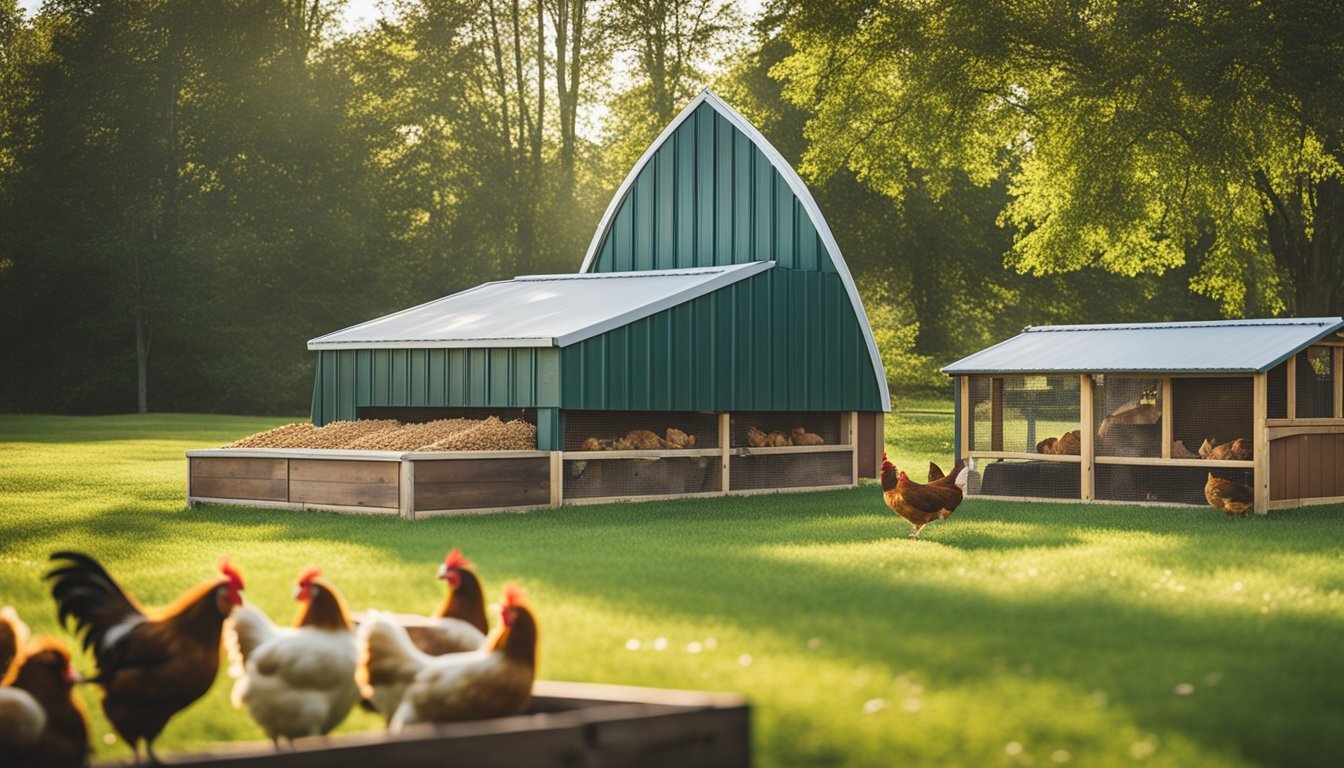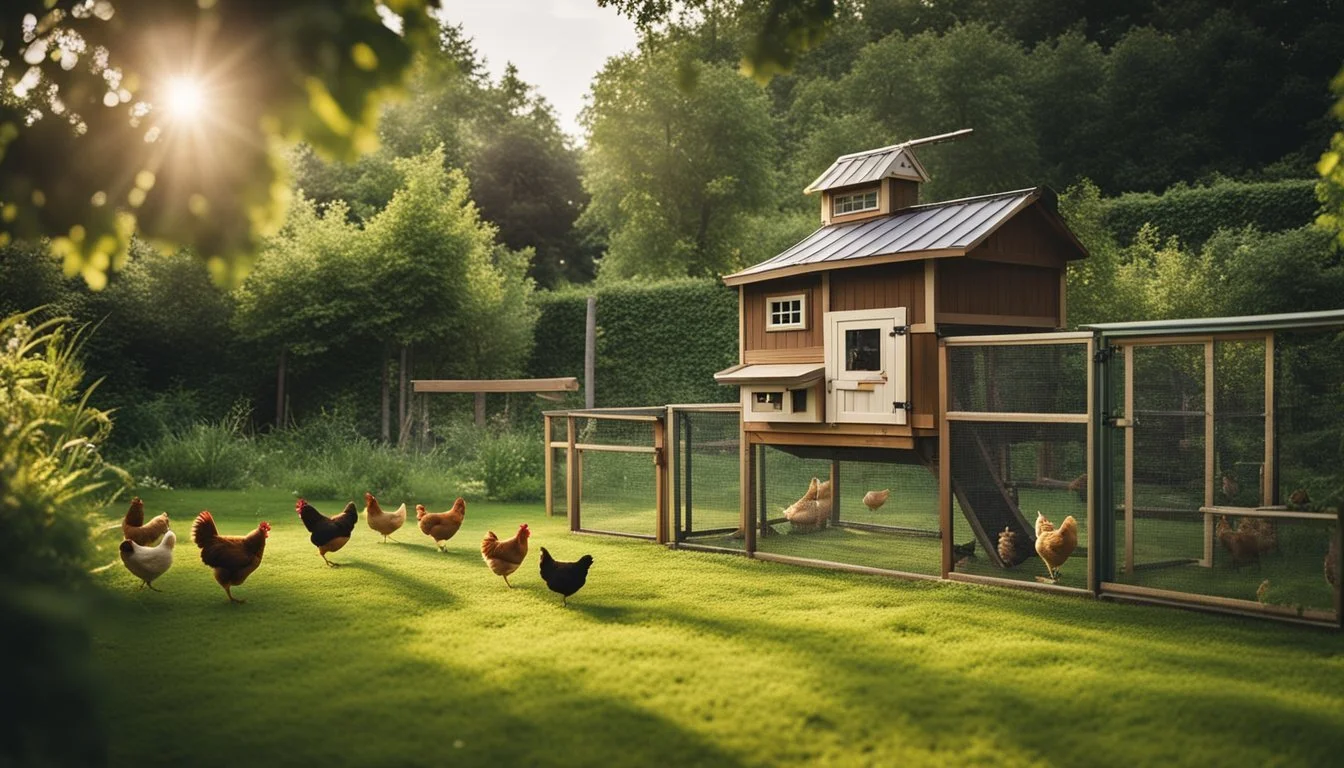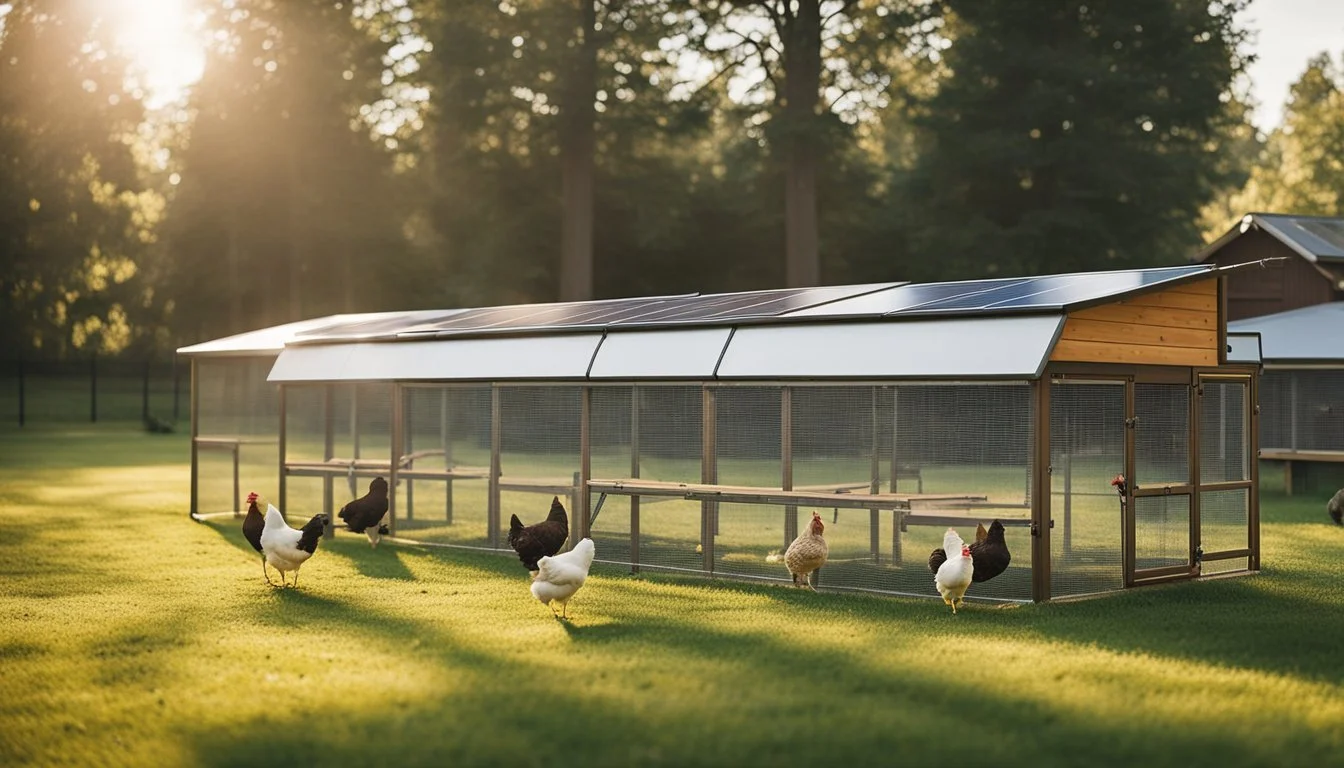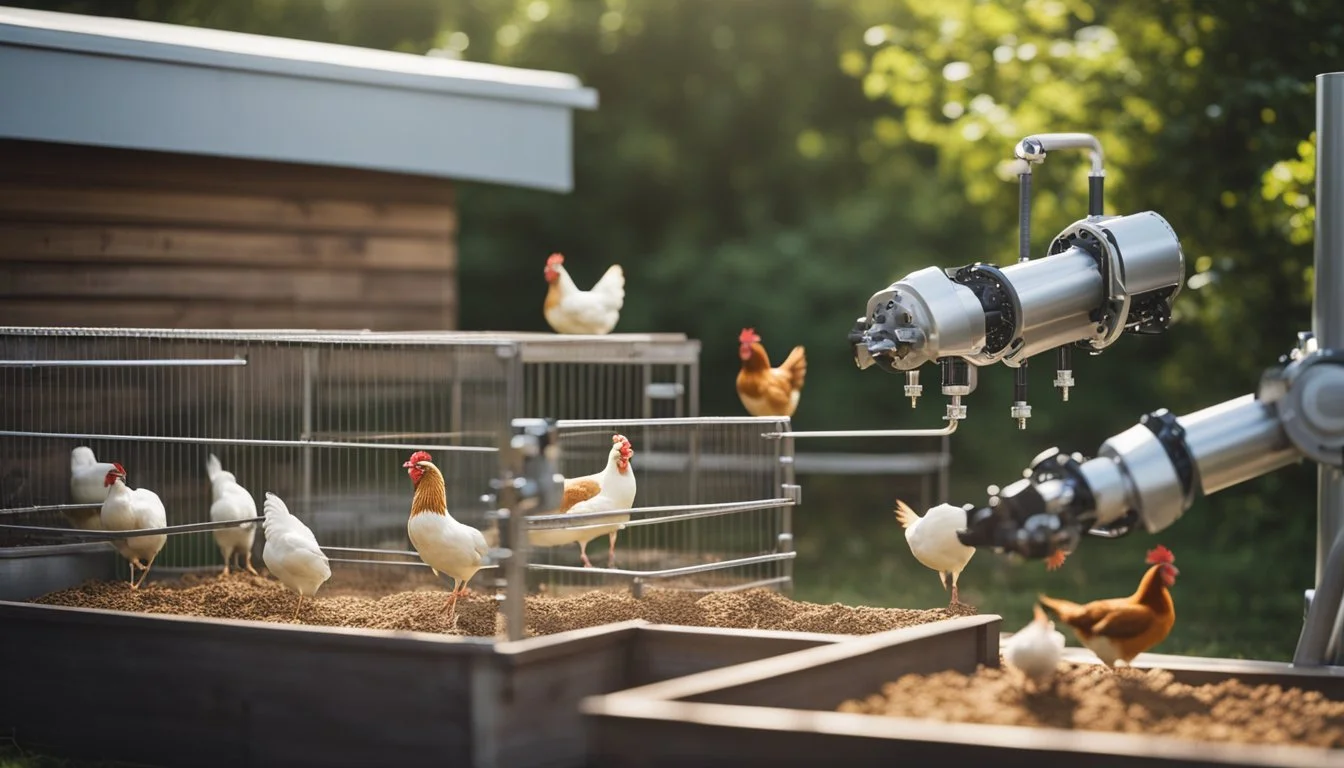8 Tips for Raising Chickens with a Busy Schedule
Efficient Strategies for Success
Raising chickens can seem daunting, especially for those with busy schedules. The process involves not only providing food and water but also ensuring their living environment is safe and clean to maintain their health.
Implementing efficient systems allows even the busiest individuals to successfully raise chickens without compromising their care. By using organized routines and effective tools, managing a flock can become a seamless part of daily life.
1) Setup an automatic feeder
Using an automatic feeder can save significant time for those raising chickens with a busy schedule. These feeders are designed to dispense feed at regular intervals, ensuring your chickens are consistently nourished.
Automatic feeders come in various types, including gravity, treadle, and smart feeders. Gravity feeders, such as the Royal Rooster model, use gravity to dispense the feed slowly, reducing waste.
Treadle feeders require chickens to step on a pedal to access the food. This mechanism keeps pests like sparrows and rodents away. It also helps prevent overeating by the chickens.
DIY options are also available. For instance, a five-gallon bucket can be transformed into a feeder. Drill holes at the bottom, fill the bucket with grain, and cover it with hardware cloth for safety.
Automatic feeders like the ones offered by Grandpa Feeders often come with money-back guarantees, providing assurance of their effectiveness. Many of these feeders are designed to be simple to operate and maintain, adding convenience.
Selecting the right feeder depends on your specific needs and the number of chickens. With the right setup, automatic feeders can greatly reduce the daily chores of feeding while ensuring the chickens' well-being.
2) Install a Self-Cleaning Chicken Coop
Busy individuals can benefit greatly from installing a self-cleaning chicken coop. This type of coop reduces the time spent on manual cleaning, allowing caretakers to focus on other important tasks.
Self-cleaning coops often include removable roosts and trays. These components can be easily taken out, cleaned, and replaced, simplifying the maintenance process.
Using recycled materials to build a self-cleaning coop is also a practical option. This approach is not only eco-friendly but also cost-effective.
Integrating features like tarps over the coop floor can further streamline cleaning. Simply remove the tarp, along with any bedding, and replace it after disinfecting.
Additionally, the installation of a heated waterer can prevent water from freezing during colder months. This ensures that chickens have constant access to fresh water without requiring frequent attention.
Investing in a self-cleaning chicken coop can make poultry care more manageable for those with a busy schedule, ultimately contributing to healthier and happier chickens.
3) Evaluate and choose efficient waterers
Efficient waterers are essential for busy chicken owners. Automated waterers save time and ensure chickens always have access to fresh water. RentACoop offers a popular automatic waterer that includes nipple or cup systems, which prevent spillage and contamination.
Another effective option is the Harris Farms Cup-A-Water. It features detachable tops for easy refilling, making maintenance quick and hassle-free. Choose a waterer with a capacity suitable for your flock size to minimize frequent refills.
Plastic waterers are lightweight and affordable. They are easy to clean but may lack durability. Consider the KEBONNIXS Automatic Chicken Cup Waterer for its simple design and reliable performance. Efficient waterers reduce daily chores, ensuring your chickens stay hydrated with minimal effort.
4) Provide Ample Space for Free-Ranging
Free-ranging chickens need enough space to move, forage, and express their natural behaviors. A general guideline is to allow at least 250 square feet per chicken. This space provides access to insects, seeds, and plants, crucial for a balanced diet and overall health.
If space allows, providing even more room can further enhance their well-being. Chickens that have enough space to roam are less likely to show signs of stress or engage in harmful behaviors like pecking each other.
In addition to open space, ensure there are shaded areas and shelter. These offer protection from predators and harsh weather, contributing to a safer environment for the chickens.
Setting up a well-defined perimeter can help keep chickens within the designated area and deter predators. Using fencing or natural barriers like bushes and trees is an effective way to manage this.
Remember, while free-ranging offers many benefits, it also comes with responsibilities. Regularly check the area for any hazards and ensure the chickens have access to continuous food and water supplies. These steps will help create a thriving environment for your free-range chickens.
5) Implement predator-proofing measures
Ensuring the safety of chickens is crucial, especially for those with busy schedules. One effective way to safeguard your flock is by using hardware cloth instead of chicken wire. Hardware cloth is sturdier and provides better protection against determined predators.
Covering the chicken run with a secure roof or hardware cloth prevents flying predators like hawks and owls from accessing the chickens. Netting can deter some predators, but for the best protection, a roof is recommended.
Securing the floors of coops and runs with hardware cloth or a cement base prevents digging animals such as raccoons and foxes from getting inside. This adds an extra layer of security.
Removing hiding spots for predators near the coop reduces the risk of surprise attacks. Keeping the surroundings of the coop clean and clear can help deter predators from getting too close.
Using robust fencing, especially with small gaps, deters climbing predators. A fence with 1/2 inch hardware cloth is particularly effective in preventing breaches from small animals.
Having a dog or spending time outside with the chickens can also help keep predators at bay. The presence of a human or a protective dog can discourage many predators.
6) Keep a Consistent Feeding Schedule
Consistency in feeding is crucial for maintaining the health and productivity of chickens. Chickens benefit from having meals at the same times each day. This helps regulate their digestive systems and reduce stress.
Feeding chickens at consistent times ensures they can expect when food will be available. This predictability makes managing their behavior easier.
Chickens typically need about 0.25 to 0.33 pounds of feed per bird daily. For different age groups and purposes, the feed requirements vary. Laying hens need a higher protein content compared to non-layers.
Incorporate essential nutrients such as amino acids, vitamins, and minerals into their feed. Offering a balanced diet keeps chickens healthy and productive.
Scheduling feeding times twice a day can be effective. Morning and late afternoon feedings work well to fit into a busy schedule.
Automation can help manage feeding times. Automatic feeders ensure chickens get fed even when no one is home. This can be especially useful for those with hectic schedules.
By setting a consistent feeding routine, caregivers can ensure their chickens stay healthy and content. This minimizes the time and effort required daily, making it more manageable to raise chickens with a busy lifestyle.
7) Utilize chicken-friendly technology
Incorporating technology can significantly reduce the effort of managing a chicken coop for those with a busy schedule. Automated feeders and waterers ensure chickens are fed and hydrated without daily manual intervention.
Temperature control is another critical aspect. Smart thermostats can control heaters and fans, maintaining a comfortable environment in the coop. This reduces the need for constant monitoring.
Security is vital as well. Door and window sensors can alert you to any potential breaches in the coop, protecting your flock from predators. Motion-activated cameras can provide additional peace of mind by allowing remote monitoring.
Using smart technology can streamline many tasks associated with raising chickens, making the process more efficient and less time-consuming.
8) Seek Community Support for Chicken Care
Forming connections within your community can be a great asset when caring for chickens with a busy schedule.
Neighbors or local friends might be willing to help. They can check on your chickens, especially when you're away.
Local farms or gardening groups often have members experienced with poultry. They can offer valuable advice and might even assist in emergencies.
Online forums and social media groups dedicated to chicken care can also be beneficial. These platforms allow for quick questions and problem-solving with experienced chicken keepers.
Consider sharing responsibilities with other local chicken owners. A cooperative system could ensure your chickens receive consistent care while distributing the workload.
Trustworthy children in your neighborhood might be eager to help in exchange for a small allowance or fresh eggs. Introducing them to chicken care could be educational for them and a time-saver for you.
Engaging with your community not only eases your schedule, but also fosters a supportive network for both you and your chickens.
Choosing the Right Chicken Breed
Choosing the right chicken breed can impact how smoothly you manage your flock and how well they fit into your busy schedule. This involves understanding each breed’s egg production capabilities, hardiness, and care requirements.
Best Breeds for Busy Owners
For those with hectic schedules, it's essential to choose low-maintenance breeds that are productive and hardy. Lohmann Browns are excellent as they lay over 300 eggs yearly and require minimal special care.
Hybrids like Golden Comet are another great option, producing about 280 eggs per year, while needing less feed and less frequent attention. Australorps and Barred Rocks are reliable layers, supplying around 5-6 eggs per week, making them ideal for those who need consistent egg supply without high-maintenance care.
Breed Characteristics and Care Needs
When selecting a breed, consider their adaptability to your climate. Sussex, Araucana, and Cochin are well-suited for colder environments and can tolerate lower temperatures without issues.
In contrast, breeds like Andalusians thrive in warm climates but can suffer in cold weather, making them less ideal for regions with harsh winters. Also, choose breeds that are less likely to become broody, like Golden Comet, to minimize disruptions in egg production.
Each breed has unique characteristics that influence how much care they need, so aligning a breed's traits with your available time and resources will ensure a healthy, productive flock.
Automating Chicken Care
Automating chicken care can help busy individuals manage their poultry efficiently. Key elements to consider include automated feeders and waterers, which ensure that chickens have access to food and water without constant manual intervention.
Understanding Automated Feeders
Automated feeders release food at scheduled intervals.
These feeders typically operate with a timer, ensuring that chickens get fed even when the owner is not available. There are different models, ranging from simple gravity-based designs to more advanced programmable systems.
Capacity: Choose a feeder with adequate capacity to reduce refill frequency.
Material: Durable materials like metal or heavy plastic are preferable.
Maintenance: Regular cleaning is essential to prevent mold and pests.
Automated feeders can prevent food spillage and waste, keeping the coop clean and reducing feed costs.
Benefits of Automatic Waterers
Automatic waterers provide a continuous supply of fresh water.
These systems can be connected to a water source, refilling a reservoir or dispensing water directly to drinking cups or nipples as needed. They are beneficial in maintaining water hygiene and consistency.
Design: Select waterers that are easy to clean and resistant to freezing if you live in a cold climate.
Flow Control: Adjustable flow settings can help manage water pressure and prevent leaks.
Health: Continuous access to fresh water supports the health and productivity of the flock.
Using automatic waterers reduces the need for frequent manual refills, ensuring that chickens remain hydrated at all times. This system can significantly lower the risk of birds suffering from dehydration, particularly in hot weather.
Efficient Daily Routines
Managing a daily routine for backyard chickens can be simplified by focusing on key tasks in the morning and evening. Streamlining these processes ensures that chickens remain healthy and their environment safe, even with a busy schedule.
Streamlining Morning Tasks
Morning routines are crucial for the well-being of chickens. Start by performing a quick health check on each bird. Look for any signs of illness, distress, or unusual behavior. This can prevent minor issues from becoming major problems.
Next, ensure fresh food and water. Clean and refill water containers and check feed levels. Using automatic feeders and waterers can save time. Make sure the coop has good ventilation, and remove any remnants of the previous day’s bedding to reduce ammonia build-up.
Let the chickens out of the coop to access the run or free-range area. This promotes exercise and reduces stress. Securely latch all doors and gates to keep predators out. If time is tight, consider using solar-powered automatic doors for the coop.
Simplifying Evening Checks
Evening checks provide an opportunity to secure the chickens and prepare for the next day. First, make sure all chickens have returned to the coop. Chickens naturally return to the coop at dusk, but a quick headcount ensures none are missing.
Close and lock the coop doors. Use latches or locks that are predator-proof to prevent nocturnal threats. Inspect the coop for any structural issues, such as gaps or weak spots that predators could exploit.
Top off food and water supplies. Although this is primarily a morning task, ensuring they have enough for the evening can be helpful. Lastly, check nesting boxes for eggs, which can be collected and stored. This reduces the risk of eggs being broken or soiled overnight.
By focusing on these tasks, chicken owners can maintain their flock’s health and safety efficiently, even on a busy schedule.








